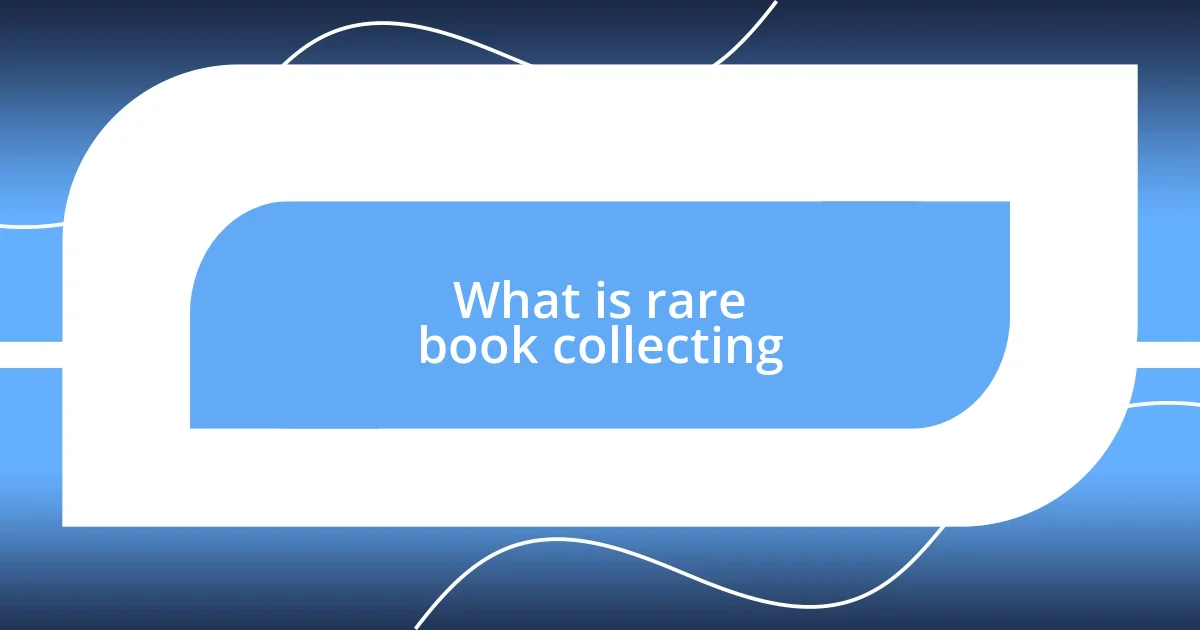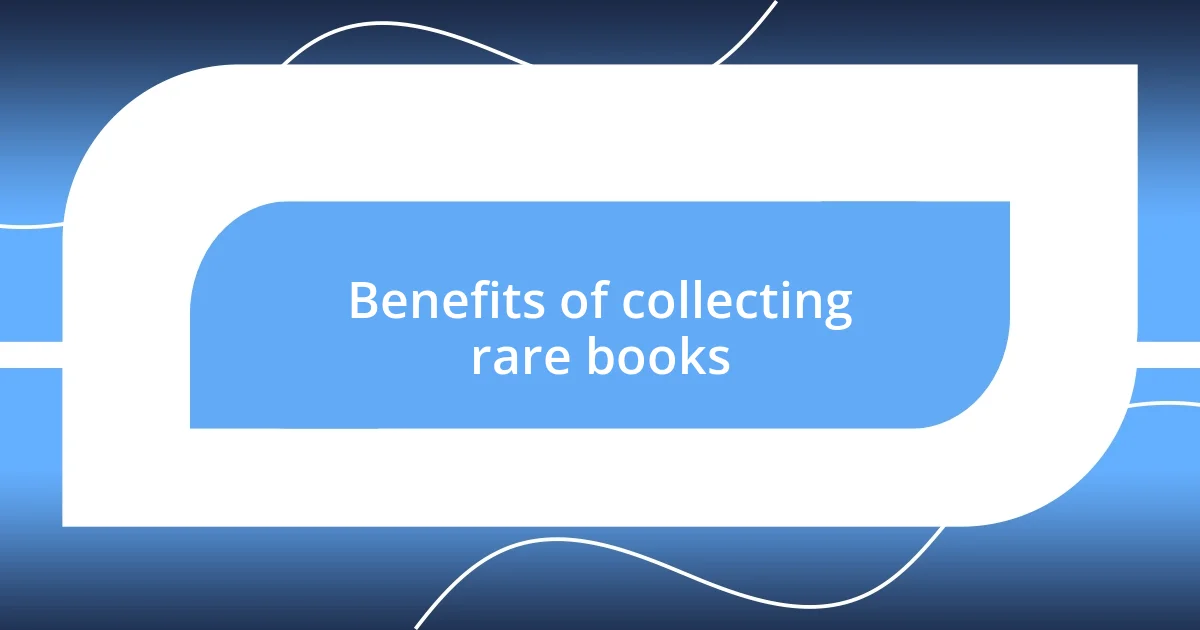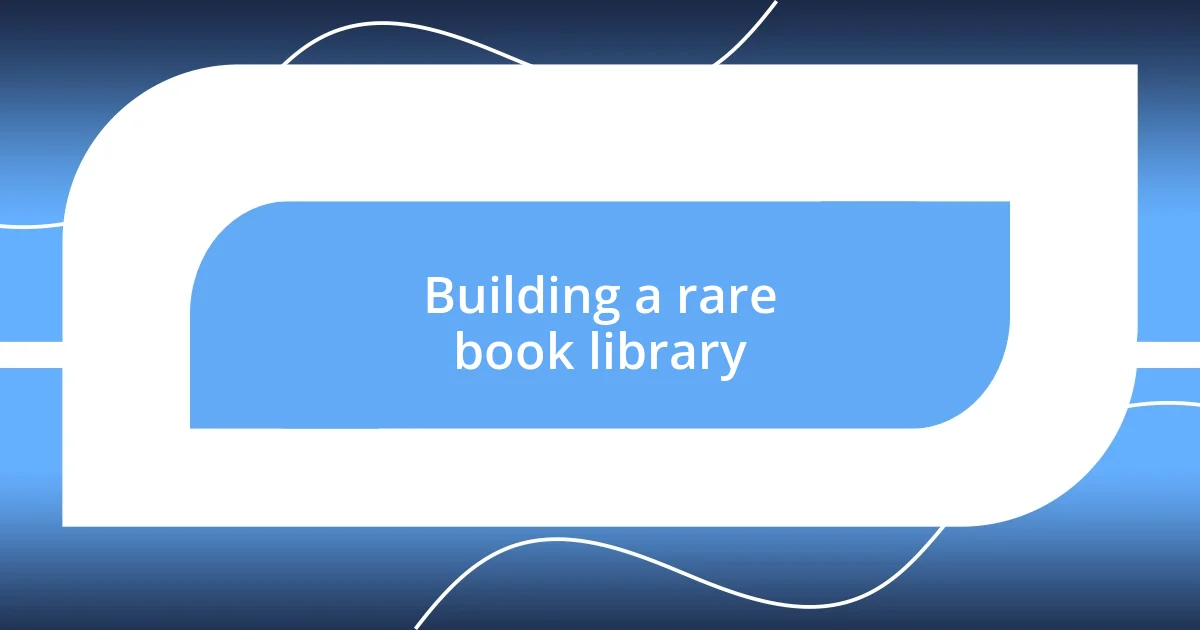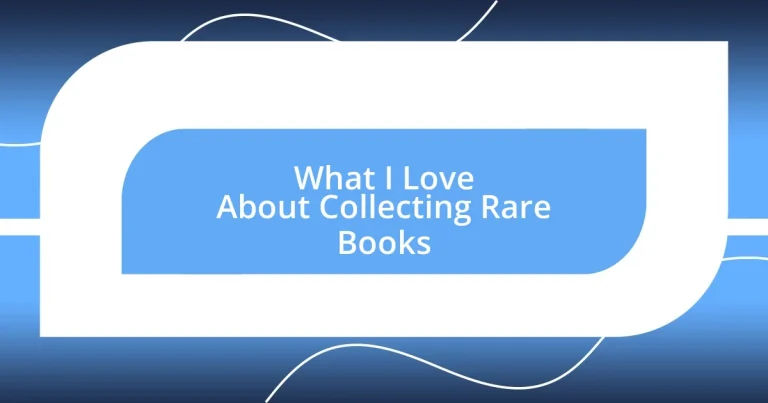Key takeaways:
- Rare book collecting is a deeply emotional journey, characterized by personal connections to literature and the allure of unique qualities in each book.
- Key factors in selecting rare books include condition, provenance, rarity, significance, and market trends, all of which enhance the value and enjoyment of the collection.
- Building connections with other collectors enriches the experience, fostering community engagement, knowledge sharing, and new perspectives on collecting.

What is rare book collecting
Rare book collecting is both an art and a passion, encompassing the thrill of seeking out books that are not just hard to find, but also have historical significance or unique qualities. I still remember the exhilaration I felt when I stumbled upon a first edition of my favorite classic at an estate sale; it felt like I had discovered a hidden treasure! What makes rare books so special is often tied to their story—the whispers of past ownership, the scent of old paper, and the weight of history contained within those pages.
In my experience, rare book collecting isn’t just about the acquisition of physical items; it’s a deep emotional connection to the literary world. Every time I add a new book to my collection, it feels like I’m participating in a lineage of readers who have cherished these works long before me. Have you ever held a book in your hands and felt its magic? That sense of continuity and belonging is what truly fuels my passion for collecting.
I’ve also come to realize that the beauty of rare book collecting lies in its diversity. Whether it’s a unique binding, an author’s inscription, or a fascinating backstory, no two rare books are alike. This endless variety sparks my curiosity and drives my quest, reminding me of the limitless adventures waiting within each tome. Isn’t it intriguing how a dusty bookshop can become a portal to countless stories?

Benefits of collecting rare books
Collecting rare books offers a treasure trove of benefits that go beyond just the joy of owning unique editions. Personally, I’ve found that it has significantly enhanced my appreciation for literature. Each rare book provides a glimpse into the past, revealing how authors connected with readers during their time. One of my most cherished finds was an early signed copy of a beloved novel. The moment I opened it, I felt a palpable connection to the author—a shared moment across time that is simply irreplaceable.
Moreover, rare book collecting has cultivated a sense of community for me. I often attend book fairs and auctions where like-minded enthusiasts gather to share stories, tips, and personal finds. It’s inspiring to exchange recommendations and hear about the adventures behind each collection. There’s a distinct thrill in discovering others who share this passion. The friendships I’ve formed through this hobby have enriched not only my collection but my life overall.
Additionally, there are tangible benefits, such as the potential investment value of rare books. While the main driving force for me is the love of literature, I’ve seen some books in my collection appreciate significantly over the years. This aspect adds another layer to the experience, making it a blend of passion and prudence. It’s fascinating to think that a book I’ve poured my heart into collecting could serve not just as a source of joy but also an investment in the future.
| Benefit | Personal Insight |
|---|---|
| Emotional Connection | I feel honored to continue the legacy of past readers. |
| Community Engagement | Sharing stories at book fairs has led to invaluable friendships. |
| Investment Potential | My collection has become a blend of passion and future investment. |

Important factors in book selection
Selecting rare books can be a nuanced process that reflects both personal taste and broader market trends. Personally, I’ve learned that the condition of the book is a non-negotiable factor; even the slightest wear can affect its value. I still remember passing on a beautiful leather-bound volume because the spine was a bit worn—it felt like losing a potential friend, but I knew better in the long run.
Here are some key factors I consider when selecting rare books:
- Condition: Look for well-preserved copies; factors like dust jackets, bindings, and pages all play a role in value.
- Provenance: Understanding the book’s ownership history adds depth and context, often increasing emotional value.
- Rarity: Editions with fewer copies available can be especially valuable.
- Significance: Books that have cultural, historical, or literary importance resonate more deeply with collectors.
- Market Trends: Staying informed about what’s currently sought-after can guide your choices, helping you make strategic acquisitions.
Every book holds a story, and I find that the thrill of uncovering these stories makes the selection process an adventure in itself. Whether it’s an obscure author’s work that catches my eye or a celebrated classic with an intriguing history, each decision feels like a personal journey, adding layers of excitement and meaning to my collection.

Tips for finding rare books
When it comes to finding rare books, I always recommend starting with online marketplaces and auction sites. Websites like eBay and AbeBooks can be gold mines if you know what to look for. I vividly recall discovering a first edition of my favorite childhood story tucked away on an auction site—I felt a rush of excitement that still gives me goosebumps. Just make sure to verify the seller’s credibility; it’s like deciphering a book’s back cover before diving in.
Navigating local bookstores can also be an adventure worth pursuing. Many independent shops hold curated collections of rare books. I remember visiting a tiny, dusty bookstore where the owner shared stories of his best finds. It made each book feel alive, as if I was holding history in my hands. Have you ever felt that thrill of flipping through pages of a hidden gem? I truly believe that building relationships with local booksellers can lead to wonderful discoveries, as they often know when new, rare items come in.
Another effective tip is to connect with fellow collectors through social media and forums. Engaging in discussions and joining specialized groups has opened countless doors for me. I still smile when I think of a time when a fellow collector shared the news of a rare book fair a few towns over; that event led me to acquire a beautiful edition I had been chasing for years. Why not tap into this wealth of knowledge and experiences? It’s thrilling to think that the next valuable addition to your collection could come from a simple conversation!

Caring for your rare books
Taking care of your rare books is crucial to preserve their beauty and value. I remember the first time I bought a rare book and just tossed it onto my shelf, thinking it would be fine. A few months later, I noticed the corners were getting damaged. From that experience, I’ve learned that using protective covers can be a game changer. Simple sleeves or boxes not only shield the books from dust but also protect them from the natural oils from our hands, which can cause discoloration over time.
Humidity and temperature play significant roles in preservation too. I vividly recall a summer when my air conditioning broke, and I worried about my books. To ensure they were safe, I moved them to a cooler area of my home and used a hygrometer to monitor humidity levels. Investing in a good-quality dehumidifier helped maintain a stable environment. It’s fascinating how even small changes in climate can impact the integrity of these treasures.
When it comes to handling rare books, I always advocate for a gentle touch. I often think back to an old book I found with delicate pages. I learned to cradle it as if it were a fragile flower. By supporting the spine and turning the pages carefully, I’ve managed to enjoy these stories without compromising their condition. Have you ever felt the thrill of turning a page of a book that feels like a piece of history? It’s part of the joy of collecting, and I believe treating these books with respect only enhances that experience.

Building a rare book library
Building a rare book library is a journey that combines passion with a bit of strategy. I recall the excitement of planning my first bookshelf display; I meticulously arranged my finds to create a visual narrative. Does anyone else feel a sense of pride seeing their collection come to life? When each title has a story, both in its content and how it landed on your shelf, it transforms the library into an inviting space that sparks conversation and inspires curiosity.
A great starting point is focusing on a specific theme or period that resonates with you. For example, I enjoy collecting vintage science fiction novels, which has shaped not only my collection but my understanding of the genre’s evolution. Each book feels like a window to another time and place. Have you ever tried collecting based on a theme? Creating this focus adds depth and personal significance to the collection, because every addition feels like a meaningful choice rather than just another book on the shelf.
As your collection grows, consider the logistics of storage and display. I learned this the hard way when a poorly balanced stack of books toppled over, leaving me with a minor disaster and a few damaged spines. Investing in sturdy shelves and perhaps decorative bookends is a small price to pay for peace of mind and longevity. After all, a well-displayed collection not only protects your treasures but also showcases the love you have for these literary gems. Don’t you want your collection to tell a story, too?

Connecting with other collectors
Connecting with other collectors in the rare book community brings a sense of camaraderie that I absolutely cherish. I vividly remember attending my first book fair; I was a bit shy at first, but when I began chatting with fellow collectors, it felt like coming home. Have you ever experienced that? Sharing our stories, insights, and even a few laughs creates a bond that’s genuine and enriching.
I find that joining online forums or local clubs is another fantastic way to foster these connections. The discussions can be incredibly enlightening, leading to new perspectives on collecting that I hadn’t considered before. Once, I shared a photo of a recent acquisition, and the feedback I received from others helped me appreciate its historical context even more. Isn’t it fascinating how a single image can spark a dialogue that expands your appreciation for a book?
Moreover, exchanging tips on sourcing and caring for rare books can transform your collecting journey. I often seek advice from fellow enthusiasts about the best shops or websites for rare finds. Once, a friend recommended a little-known bookshop that ended up housing one of my most prized possessions. Can you imagine the thrill? Those connections are vital; they not only support your passion but also enhance your collecting experience in ways you might not expect.














